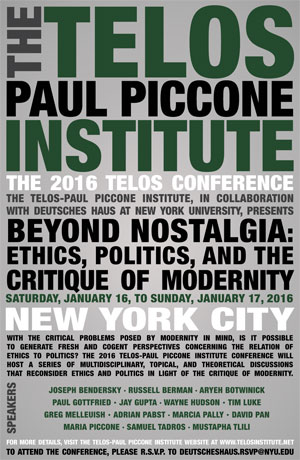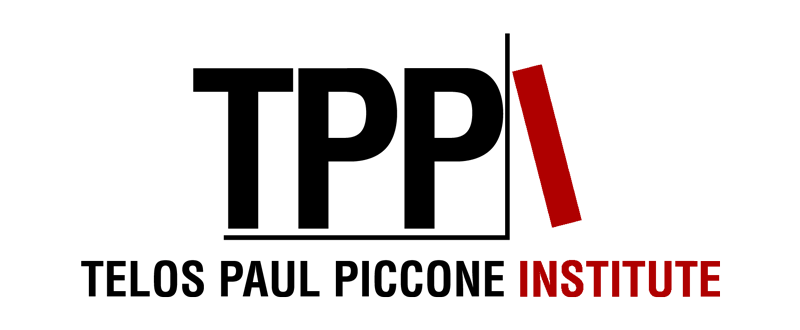The 2016 Telos-Paul Piccone Institute Conference
January 16–17, 2016
New York, NY
The Telos-Paul Piccone Institute, in collaboration with
Deutsches Haus at New York University, presents
Beyond Nostalgia:
Ethics, Politics, and the Critique of Modernity
View the conference program (PDF)
 The unique character of the modern world has made thinking through the relation of the ethical to the political extremely pressing and yet deeply problematic. Since the 19th century, critics of modernity have pointed to various forms of skepticism, alienation, indeterminacy, and abstraction that contribute to a sense of ethical crisis. They point to a sense of uprootedness from the stability and meaning-conferring powers of cultures, traditions, and communities. It may be said without exaggeration that this sense of ethical crisis has global theoretical and practical significance. Various forms of alienation—economic, spiritual, political—have arguably led to extremist versions of the critique of modernity. One everywhere sees the effects of this alienation in the actions of those who take ethical life to have been severed from political life, from the brutal and atavistic program of "global jihad," to the troubling rise of various forms of crypto-fascism in Europe. At the theoretical level, political reality has come to be seen as divorced from ethical life. The political world is seen as either a kind of contingent result of competing interests or a coercive set of structures that impinge on rather than help actualize human freedom. Postmodern critiques of liberalism and secularism tend to be characterized by a nostalgic yearning for a lost sense of ethical and political unity. It remains to be seen whether these latter theoretical projects can persuasively specify the relation of the ethical to the political, or whether they will succumb to merely atavistic gestures towards a restoration of a lost world of cultural cohesion.
The unique character of the modern world has made thinking through the relation of the ethical to the political extremely pressing and yet deeply problematic. Since the 19th century, critics of modernity have pointed to various forms of skepticism, alienation, indeterminacy, and abstraction that contribute to a sense of ethical crisis. They point to a sense of uprootedness from the stability and meaning-conferring powers of cultures, traditions, and communities. It may be said without exaggeration that this sense of ethical crisis has global theoretical and practical significance. Various forms of alienation—economic, spiritual, political—have arguably led to extremist versions of the critique of modernity. One everywhere sees the effects of this alienation in the actions of those who take ethical life to have been severed from political life, from the brutal and atavistic program of "global jihad," to the troubling rise of various forms of crypto-fascism in Europe. At the theoretical level, political reality has come to be seen as divorced from ethical life. The political world is seen as either a kind of contingent result of competing interests or a coercive set of structures that impinge on rather than help actualize human freedom. Postmodern critiques of liberalism and secularism tend to be characterized by a nostalgic yearning for a lost sense of ethical and political unity. It remains to be seen whether these latter theoretical projects can persuasively specify the relation of the ethical to the political, or whether they will succumb to merely atavistic gestures towards a restoration of a lost world of cultural cohesion.
Often the ethical impulse behind modern political activism either remains obscure or is not even acknowledged. As Alasdair MacIntyre noted thirty years ago, ethical and political discourse has become increasingly shrill as opposed camps take one or another form of relativism for granted, yet also proceed according to ethical assumptions about the possibility of social justice. Rather than pointing the way to a resolution, modern moral theory—utilitarian and deontological ethics—merely reflects this crisis. A salutary return to virtue ethics seems to hold some promise, although again, one must be on guard against the lure of nostalgia.
Perhaps no greater indication of the perceived severance of ethics from politics is a kind of Machiavellian commonsense shared by both ruler and ruled that is schizophrenically joined to classical assumptions about citizenship and sovereignty. The de-politicized subjects of modern liberal democracies take it for granted that their consent has been manufactured and their perceptions and judgments manipulated and determined, but also expect rational and ethical justifications for public policy and legislation from their leaders. This set of practical attitudes mirrors a divide in political theory between those who take it to be an ethical enterprise, and those who take it to be an empirical enterprise grounded in self-interested human motivation and power relations.
With the critical problems posed by modernity in mind, is it possible to generate fresh and cogent perspectives concerning the relation of ethics to politics? The 2016 Telos-Paul Piccone Institute conference will include multidisciplinary, topical, and theoretical discussions on the following topics:
- Multicultural mosaics, civilizational clashes, and cosmopolitan ideals
- Ethics and executive action: Human rights vs. the demands of the security state (e.g., drone warfare)
- Ethics, race, and racism (e.g., the ethics and racial politics of policing; #blacklivesmatter)
- Ethics and politics of global jihad
- The possibility of virtue ethics in political modernity
- Global ethics and politics of global warming
- Ethics of right-wing politics in Europe
- Ethics and politics of capital (wealth inequality and the threat to democracy; economic liberalism vs. the demands of citizenship; libertarian vs. communitarian conceptions of freedom)
- Ethics and politics of secularism and "postsecularism"
- Moral and political theory in a modern culture of skepticism and irony
- Ethics and biopolitics
- Crypto-normativity in Marxist and Postmodern critiques of modernity
The conference will also turn to theoretical discussions on fundamental questions: What is the "ethical"? What is the "political"? How should we think the relation? Is political space a species of ethical space, or are they systematically distinct? What is the ethical dimension of political institutions? Who or what is the "political animal"? (What conceptions of "human nature" are deployed in the notion of the zōon politikon?) Can explanations for empirical realities be sound if they ignore alternative motivations rooted in ethical considerations? (For example: does the assumption that politicians are always driven by short-term concerns with political survival adequately explain empirical realities?) Are ethical considerations beside the point in light of stark insights into realpolitik and political power? What ought a polity with a democratic self-understanding expect from its rulers in an age of terrorism and perennial war? Are there arguments for the widely presumed ethical superiority of democracies, or do such presumptions reflect a particular set of "values"?
